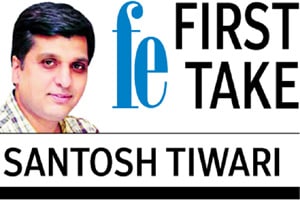 Prime Minister Narendra Modi did well by accepting UPA’s Aadhaar as the base model for reforms in the government subsidies and entitlements disbursement system, but Finance Minister Arun Jaitley has missed a similar opportunity to reform the income tax (I-T) system by rejecting the Direct Taxes Code (DTC).
Prime Minister Narendra Modi did well by accepting UPA’s Aadhaar as the base model for reforms in the government subsidies and entitlements disbursement system, but Finance Minister Arun Jaitley has missed a similar opportunity to reform the income tax (I-T) system by rejecting the Direct Taxes Code (DTC).
Instead, he has now engaged the Finance Ministry in scattered exercises for bringing in the required changes in the income tax domain — while the ministry is discussing ways to reduce the corporate tax rate from 30% to 25% over the next four years, a committee has now been set-up to simplify the I-T rules to avoid confusion in interpretation and improve ease of doing business.
This is besides the Justice A P Shah panel looking at legacy tax issues and also the committee to decide on new retrospective tax amendment cases.
The new 10-member panel set up on Tuesday, headed by Justice R V Easwar (retd), will submit the first batch of the report by January 31, before the budget for FY17, and according to FM Jaitley the main idea behind setting up the committee is to make the I-T Act taxpayer friendly.
The question to be asked here is if an elaborate exercise has already taken place in the government and also in Parliament in the formulation of the DTC to achieve this objective, why start it afresh and do it in a scattered manner?
The purpose behind the exercise is also hard to understand because the Tax Administration Reforms Commission (TARC) has already submitted a voluminous report dealing with the full gamut of measures to make the revenue administration taxpayer friendly.
The two basic requirements of a good tax system are reasonable rates with bare minimum exemptions, or if possible, no exemptions, and a transparent tax administration — DTC 2009 largely takes care of this and remaining changes could be based on the TARC suggestions.
So, why not just make the necessary inclusions in DTC and get it passed in Parliament. The Congress party proposed it so it will have to think hard before opposing it.
The 2009 DTC Bill proposed that the income between Rs 1.6 lakh to Rs 10 lakh in case of individuals will be taxed at 10%, between Rs 10 lakh and Rs 25 lakh at 20%, and that over Rs 25 lakh at 30%, along with the removal of tax deductions on life insurance, provident fund investments and also home loans.
Currently, income up to Rs 2.5 lakh is tax exempt, and between Rs 2.5 lakh and Rs 5 lakh is taxed at 10%, the 20% rate is applicable for income between Rs 5 lakh and Rs 10 lakh, and that above Rs 10 lakh is taxable at 30%. Various tax deductions are also continuing.
One of the biggest reasons for tax evasion in the country today and a low taxpayer base of just 3.5 crore is that the highest rate of 30% kicks in at a low income of Rs 10 lakh and this has been pointed out by several panels — going back to DTC will be a big help for the finance minister here.
FM Jaitley has changed his views on several issues, and for the good, including that on MAT on FIIs, and this is another good opportunity, which will save him from unending confusion.
The finance minister has already agreed to a 25% rate for the companies which the DTC had suggested and it is time he extends the whole process for individuals also.

